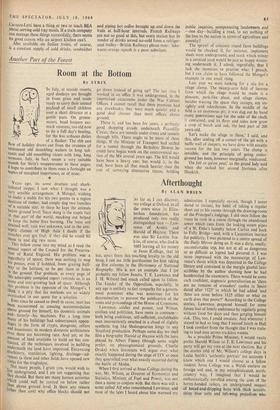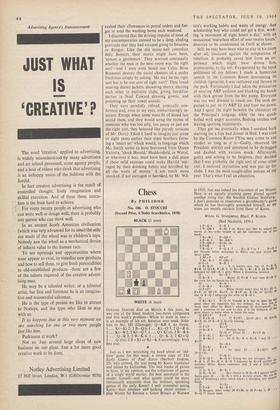Afterthought
By ALAN BRIEN
So far as I can discover, my college at Oxford, in all the years since its Eliza- bethan foundation, has produced only two really distinguished men -- Law- rence of Arabia and Harold of Huyton. There was also Sir Leoline Jen- kins, of course, who died in 1685 leaving all his money to Jesus (College, that is)
but, apart from this touching loyalty to the old heap, I can see little justification for him taking
up five columns in the Dictionary of National • Biography. His is not an example that I (or probably my fellow Jesuits, T. E. Lawrence and J. H. Wilson) feel much called upon to follow. The Leader of the Opposition, especially, in any age is unlikely to feel sympathy for a govern- ment pensioner who was notorious for his determination to prevent the publication of the votes and proceedings of the House of Commons.
Lawrence, soldier and poseur, and Wilson, civilian and politician, have more in common— both being ambitious, self-sufficient, unclubbable men intermittently swathed in a cloud of slightly synthetic fog like Shakespearian kings in any Stratford production. Perhaps some day we shall film a biography Harold of Huyton with the hero played by Albert Finney (though some might prefer, on physiognomical grounds, Charlie Drake) when historians will argue over what exactly happened during the siege of ITV as once they quarrelled over what exactly occurred duting the battle of Akaba.
When I first arrived at Jesus College during the war, Mr. Wilson, as Director of Economics and Statistics, Ministry of Fuel and Power, was not then a name to conjure with. But there was still a scout called Alf who remembered Lawrence, and most of the tales I heard about him warmed my
admiration. I especially envied, though I never dared to imitate, his habit of taking a regular short cut to his rooms through the drawing-room of the Principal's lodgings. I did once follow the route he took in a canoe through the abandoned sewer which runs from the leaking steam pipes of a St. Ebbe's laundry below Carfax and back to Folly Bridge—and, with a Laurentian instinct for publicity, I was pictured in a centre spread of the Daily Mirror doing so. It was a dirty, smelly, uncomfortable trip, but not at all as dangerous or as difficult as legend had pictured it. I was more impressed with the manuscript of Law- rence's thesis which was deposited in the College library and contained in the margin gleeful later scribbles by the author showing how he had bamboozled the examiners. There would be some such confident, dogmatic generalisation as 'there are no remains of crusaders' castles in Spain dated after 1125' to which he had added 'and there are none before 1125 either so what on earth does that prove?' According to the College stories, Lawrence prepared himself for some future feat of lonely endurance by regularly going without food for days and then gorging himself sick. This, too, I could emulate. And whenever I stayed in bed so long that I missed lunch in Hall I took comfort from the thought that I was train- ing to lead men across trackless wastes.
As a possible Prime Minister, I would vastly prefer Harold Wilson to T. E. Lawrence and his party will get my vote at the next election. But if the stories told of Mr. Wilson's college days in Leslie Smith's 'authentic portrait' are accurate I know which one I would choose as a fellow
student. Jesus College was a Welsh enclave on foreign soil and, in my unsophisticated, north- country way, I imagined that I would be enthusiastically enrolled among the sons of the horny-handed toilers, an underground maquis of bread-and-dripping boys with thick accents, shiny blue suits and left-wing prejudices who
cashed their allowances in postal orders and for- got to send the washing home each weekend.
I discovered that the driving impulse of most of my contemporaries seemed to be a deep, abiding gratitude that they had escaped going to Swansea or Bangor. Like the old music-hall comedian Billy Bennett, their motto might have been, 'almost a gentleman.' They worried continually whether the man in the next room was 'the right sort'—and I once even heard one Celtic Beau Brummel destroy the social chances of a pushy freshman simply by asking: 'He may be the right sort but is he our sort of right sort?' They loved wearing dinner jackets, decanting sherry, electing each other to exclusive clubs, giving breakfast parties in Noel Coward dressing gowns, and polishing up their vowel sounds.
They were painfully refined, comically con- formist and, even to my eyes, embarrassingly in- secure. Except when some mass fit of blood lust seized them, and they would scrag the rooms of someone who was too arty, too pansy or just not the right sort, they behaved like parody versions of Mr. Darcy. I find it hard to imagine just seven or eight years earlier their elder brothers form- ing a 'smart set' which would, in language which Mr. Smith seems to have borrowed from Queen Victoria, 'shock Harold.' Huddersfield, or Wirral, or wherever it was, must have been a dull place if these mild excesses could make Harold' 'out- raged by their drinking habits and horrified by all the waste of money.' I am much more shocked, if not outraged or horrified, by Mr. Wil-
son's working habits and waste of energy. Any scholarship boy who could not get a first, work-
ing 'a minimum of eight hours a day,' with an occasional 'marathon effort of over twelve hours,' deserves to be condemned to t'mill at eleven.
Still, he may have been wise to stay in his room after all, insulated against the temptations of rebellion. It probably saved him from an ex- perience which might have driven him, prematurely, to the left. Exasperated by the tepid politeness of my fellows I made a humorous speech in the Common Room denouncing its childish rigmarole. I was outlawed and thrown to the pack. Fortunately I had taken the precaution of wearing ARP uniform and blacking my hands
with thick grease from the fire pump. Everyone was too well dressed to touch me. The mob de-
parted to put on its ARP kit and hunt me down. And 1. spent the night between the chimneys on
the Principal's lodgings while the two quads boiled with angry assassins, flashing torches and waving sporting implements.
They got me eventually when I sneaked back starving for a free bad dinner in Hall. I was tried by the Common Room (`You may come to any verdict so long as it is—Guilty, observed the
President wittily) and sentenced to be de-bagged and daubed with various muck. Afterwards, guilty and aching to be forgiven, they decided that I was probably the right sort of some other sort. I received invitations and was put up for clubs. I was the most sought-after outcast of nil year. That's what I call an education.











































 Previous page
Previous page